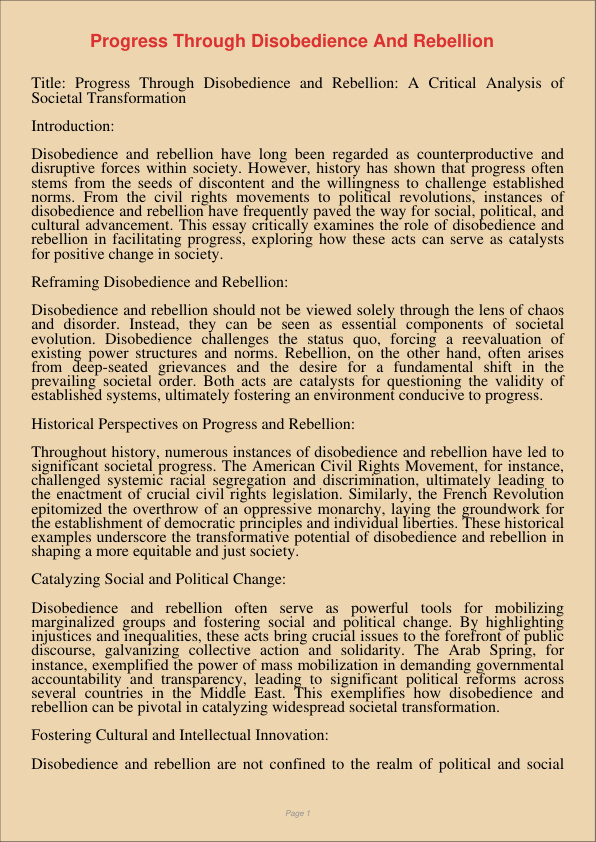Progress Through Disobedience And Rebellion
Jan 9, 2024
rebellion
progress
Sociology
Other

Title: Progress Through Disobedience and Rebellion: A Critical Analysis of Societal Transformation
Introduction:
Disobedience and rebellion have long been regarded as counterproductive and disruptive forces within society. However, history has shown that progress often stems from the seeds of discontent and the willingness to challenge established norms. From the civil rights movements to political revolutions, instances of disobedience and rebellion have frequently paved the way for social, political, and cultural advancement. This essay critically examines the role of disobedience and rebellion in facilitating progress, exploring how these acts can serve as catalysts for positive change in society.
Reframing Disobedience and Rebellion:
Disobedience and rebellion should not be viewed solely through the lens of chaos and disorder. Instead, they can be seen as essential components of societal evolution. Disobedience challenges the status quo, forcing a reevaluation of existing power structures and norms. Rebellion, on the other hand, often arises from deep-seated grievances and the desire for a fundamental shift in the prevailing societal order. Both acts are catalysts for questioning the validity of established systems, ultimately fostering an environment conducive to progress.
Historical Perspectives on Progress and Rebellion:
Throughout history, numerous instances of disobedience and rebellion have led to significant societal progress. The American Civil Rights Movement, for instance, challenged systemic racial segregation and discrimination, ultimately leading to the enactment of crucial civil rights legislation. Similarly, the French Revolution epitomized the overthrow of an oppressive monarchy, laying the groundwork for the establishment of democratic principles and individual liberties. These historical examples underscore the transformative potential of disobedience and rebellion in shaping a more equitable and just society.
Catalyzing Social and Political Change:
Disobedience and rebellion often serve as powerful tools for mobilizing marginalized groups and fostering social and political change. By highlighting injustices and inequalities, these acts bring crucial issues to the forefront of public discourse, galvanizing collective action and solidarity. The Arab Spring, for instance, exemplified the power of mass mobilization in demanding governmental accountability and transparency, leading to significant political reforms across several countries in the Middle East. This exemplifies how disobedience and rebellion can be pivotal in catalyzing widespread societal transformation.
Fostering Cultural and Intellectual Innovation:
Disobedience and rebellion are not confined to the realm of political and social activism; they also play a vital role in fostering cultural and intellectual innovation. Creative movements, such as the Beat Generation and the counterculture of the 1960s, challenged conventional societal norms, fostering a spirit of artistic experimentation and cultural redefinition. These movements not only reshaped artistic expression but also influenced broader social attitudes, promoting inclusivity, diversity, and the celebration of individual expression.
Conclusion:
Disobedience and rebellion, often stigmatized as disruptive and divisive, are integral components of societal progress. Through the questioning of established norms, the challenging of oppressive systems, and the fostering of cultural innovation, these acts have consistently served as catalysts for positive change. It is imperative to recognize the transformative potential of disobedience and rebellion, acknowledging their role in shaping a more just, equitable, and progressive society. By embracing the lessons of history and understanding the nuanced dynamics of dissent, we can cultivate a more inclusive and resilient societal fabric that values the pursuit of justice and equality.